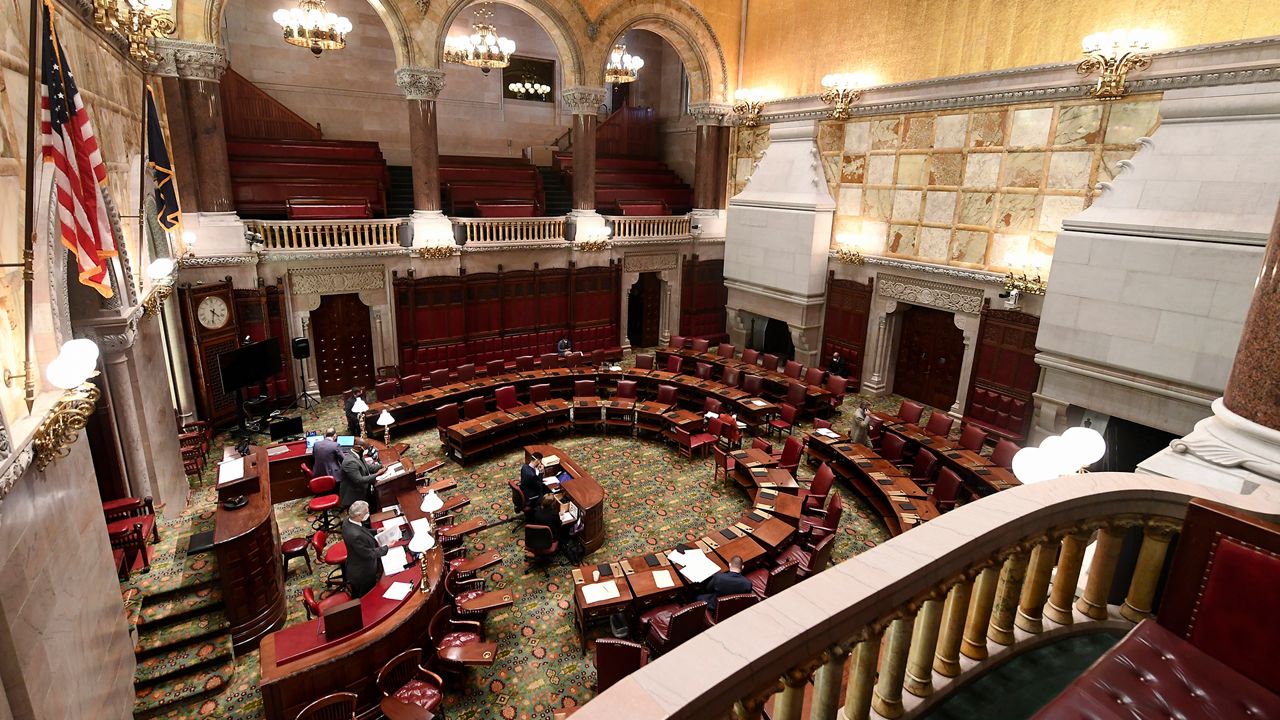As he was about to cast a vote in favor of repealing a law governing secrecy surrounding police disciplinary records, Sen. Zellnor Myrie of Brooklyn put it this way: "Only in this country can I be pepper sprayed on a Friday and be a policymaker on a Tuesday."
The state Senate voted along party lines on Tuesday to repeal 50-a, an effort that is meant to boost transparency surrounding police disciplinary records. The bill is just one of 10 that lawmakers are approving with relatively lightning speed surrounding reforms to policing.
Chokeholds will be outlawed, statistics on who is ticketed by gender, ethnicity and race will be required to be published. Today, lawmakers are expected to take up two oversight bills for law enforcement, including a codification of a special prosecutors office to investigate police-involved deaths of civilians.
In all, it's hard to imagine these measures passing with relative ease without large Democratic majorities in the state Assembly and state Senate.
Republicans had held onto their majority by their finger nails for much of the last decade, joining in alliances with a faction of breakaway Democrats that is now defunct.
Democrats gained a full majority in 2018, which has enabled them for the most part to muscle through bills like the repeal of 50-a that advocates had long sought, but never seemed likely with Republican influence in the chamber.
Republicans in New York are generally considered more liberal than the rest of the nation at large. This is the same party, after all, that put a same-sex marriage bill on the floor of the chamber to a vote in 2011. Four Republicans voted in favor of it, only to quickly lose or leave their seats.
Republicans, however, are now largely bystanders to the process.
"The Democrat repeal of Civil Rights Law 50-a denies due process for our law enforcement officers whose records already were available under a court’s discretion," Senate Minority Leader John Flanagan said after the repeal measure was approved.
"This change does something un-American, it provides records that include false accusations made against officers, and that does little to advance the cause of transparency. What it allows is a flood of information requests to obtain information on officers who currently face heightened anti-police rhetoric."
But a strain dating back to the 1960s, and the Rockefeller era, continues to exist in New York politics surrounding law enforcement and punishing criminality with stiff penalties as a deterrent. That led to sentences for drug crimes and fights with Mario Cuomo over the death penalty.
Republican George Pataki successfully ran on a platform of reinstating capital punishment in 1994 -- perhaps giving a lesson to Democrats of that time about being too out in front of voters on the issue.
Several GOP lawmakers are former members of law enforcement themselves. But even that began to melt somewhat during the opioid epidemic in New York. It struck communities outside of urban areas in New York, and Republicans began to talk more about treatment, less about punishment.
The newer members of the Democratic majority in the state Senate, like Myrie, are younger and more diverse. They are participating in the protests themselves, not just legisalting.
The leadership of both chambers, for the first time in the state's history, consists of a pair of black lawmakers.
"It's a privilege I do not take for granted. But I'm also an African-American woman. I'm the mother of two African-American men. I'm the grandmother of four African-American boys," Stewart-Cousins said in an interview, "and this, to be at this moment, to be able to do something at this time that ensures they feel safe in having an interaction with police, that they're being heard, and the entire community supporting the fact that their lives matter, it's important that we move to a society with racial justice that hasn't had that in 400 years, it's amazing time to be in this role."


